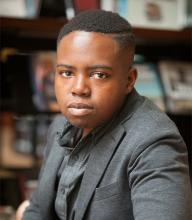The Earl and Edna Stice Lectureship in the Social Sciences presents Black Queer Studies & The State of Emergency
Aliyyah Abdur-Rahman, Associate Professor of American Studies and English at Brown University will present Black Presentism &The Practice of Ecstasy
Abstract:
Building on José Esteban Muñoz’s theorization of ecstasy as a site of queer of color desire, relational practice, and utopic possibility, this talk conceptualizes what I call the Black Ecstatic as a hermeneutic for analyzing post-Civil Rights black queer poetics. Eschewing both the heroism of black pasts and the promise of liberated black futures, the Black Ecstatic is an aesthetic performance of embrace, the sanctuary of the unuttered and unutterable, and a mode of pleasurable reckoning with everyday ruin in contemporary black lives under the strain of perpetual chaos and continued diminishment. This talk is drawn from my current book project, Millennial Style, which analyzes interrelations of political terror, social abjection and aesthetic abstraction in contemporary African Diasporic cultural production.
C. Riley Snorton, Professor of English and Gender & Sexuality Studies at the University of Chicago will present Blackness, Historicity, & the Temporality of Invention
Abstract:
If, as Tavia Nyong'o has argued, "race is a theory of history" - an explanation for why things happened the way they did - then one might also consider that race is a history of theory that functions to express what is un/thinkable across complex temporalities. In each formulation, history becomes less a program for examining change over time and more an examination of disruptions in linear time. Race, then, becomes a way of thinking history doubly, or of thinking about the history of historicity, wherein one transitive relation within blackness and transness expresses what Fanon described as "the real leap ... [of] introducing invention into existence." This talk draws from Black on Both Sides to pose questions about race as a formulation of history and blackness as an undoing of teleological time.
Presented by the Department of Gender, Women & Sexuality Studies
Thursday, April 25, 2019
4:30-7:30 including reception
Petersen Room, Allen Library

